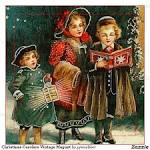Achievement! Last night we finished the original version of Charles Dickens’ “A Christmas Carol”. Due to the centuries-old language and phrasing, it was certainly the most difficult book I have ever read out loud. However, the story is well crafted and it was easy to review each previous night’s reading…in only six chapters, the penurious, mean spirited Ebenezer Scrooge is transformed into a grateful, generous soul who would claim, “I will honor Christmas in my heart and try to keep it all the year.” Of course, my son had to endure my weeping at the end of the story. SORRY. We concluded by comparing the spiritual journeys of Dickens’ Scrooge and Seuss’s Grinch.
Holiday Story Problem from Le Fictitious Local Diner – the chefs at the diner, inspired by Dickens’ “A Christmas Carol” decided to add the classic British dessert, PLUM PUDDING, onto their December menu. HOWEVER, when they read through the recipe and were overwhelmed with the list of ingredients they decided to order a plum pudding from Harrods in London and sell raffle tickets for it. If a plum pudding costs £30 (and a pound is currently worth $1.50), how much will the festive dessert cost Le Fictitious Local Diner? If the diner sells 150 tickets for $5 each, will they cover the cost of a plum pudding? How many more puddings could be purchased with the collected raffle ticket money? (Assuming, probably incorrectly, that shipping was included in the £30)?
Last night’s music theme – we listened to traditional English Christmas carols that Charles Dickens would have been familiar with:
- “The Holly and the Ivy”. An old, old carol (mention of the title is found in an essay written in 1823), so beautifully performed by a British boys choir.
- “Fantasia on Greensleeves”, by Ralph Vaughan Williams. Vaughan Williams’ dreamy composition was based upon a ballad from the 16th century. In 1865, William Chatterton Dix penned the lyrics, “What Child is This?” to be sung to the Greensleeves melody. The good news is that Dickens had five Christmas seasons to enjoy this carol before passing away in 1870. The bummer is that he missed Vaughan Williams’ effort, as the Fantasia was not composed until 1934.
- “The Wassail Song” – first we discussed the concept of wassailing (sort of a British Christmas version of trick-or-treating). Then we found out that there are two carols (we love both) that are often referred to as “The Wassail Song”, so to clarify:
- “Here We Come A-Wassailing” – composed in 1850, author unknown. This high-energy video is brimming with Christmas cheer, and the sound is EXCELLENT.
- “Wassail! Wassail! All Over the Town” – also known as “The Gloucestershire Wassail”, believed to date back to the Middle Ages. Oh boy! We found a troop of choristers singing this wassail song in YE OLDE ENGLISH costume.
- “Here We Come A-Wassailing” – composed in 1850, author unknown. This high-energy video is brimming with Christmas cheer, and the sound is EXCELLENT.
Welcome to the best part of my day!
– Jane BH



Your blogs seem to resonate with so many. First the plum pudding. My Mother, from England, always made plum pudding that she flamed when serving it and we added our own hard sauce to it so I must now look up the recipe you mentioned. And Wassailing? I always thought that was a drink. We have been known to have a wassail party serving a powerful hot punch.
Thank you for our memories, Jane.
LikeLike
BJ! Your mother was British?! So interesting! Anyway, you are correct, wassail is a powerful punch; but wassailing is caroling from house to house and looking sort of pitiful, so that the home dwellers will invite the carolers inside for a cup of said powerful punch.
LikeLike